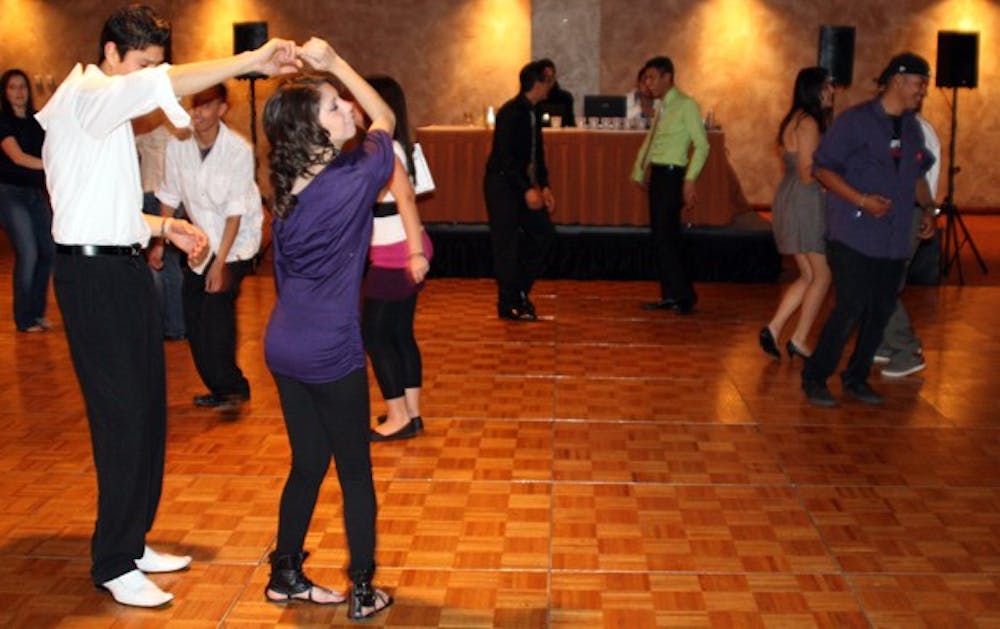On a Friday night inside the Wyndham Hotel in downtown Phoenix, Daniel Rodriguez has a Corona in one hand and his partner's waist in the other. The pair dance to Marc Anthony’s “I Need to Know.”
The DJ plays a Bachata song, a Dominican Republic-inspired Latin music genre. It has sentimental lyrics and sensual music produced by a requinto guitar, a high-pitched guitar instrument, with a heavy electric bass and bongo drums to create the dance beat.
As the song plays, Rodriguez grabs his partner closer and rests his head on his shoulder. At times they both dance much better than the other straight couples on the dance floor; other times it’s hard to see who really is taking the lead in the dance.
Rodriguez is the only guy dancing with another guy on the dance floor. He has been with his partner for about seven months, he says.
Both of them are dressed similarly: black dress shoes, black slacks and ties, Rodriguez with black-rimmed glasses and a blue button-up shirt and his partner with a lime-green button-up shirt.
Apart from the endearing songs they danced to, they both get a little more than sensual when the DJ decides to play “Noche de Entierro,” a Reggaeton song.
In the second annual dance-off, “Dance For a Dream,” more than 500 people attended. The dance floor was open to everyone, but 20 couples were sponsored. The more they danced, between 6 to 11 p.m., the more money the Arizona Dream Act Coalition, a group of mostly undocumented college students who lobby for legislation that would grant them a pathway to citizenship, would garner for scholarships.
In the past year the coalition was able to collect enough for two $300 scholarships. Until group members count the money collected for Friday’s dance, they’re still unsure of how many scholarships they can give out this year, Rodriguez says.
Couples were paid from $12 to $90 an hour, but Rodriguez and his couple, who danced from beginning to end, got sponsored for a flat rate of $300, says Lilly Romo, an organizer for the event. Companies such as El Mercado and Everyday English ESL sponsored other couples.
After Rodriguez partied the night away, he took part of the weekend to sober up and relax his muscles.
“I woke up so sore I couldn’t walk,” Rodriguez says.
Rodriguez graduated from ASU with an English and political Science degree in 2008 and finished a year of law school, but had to stop because of lack of tuition money.
His mom, in a desperate attempt to escape from the domestic violence she dealt with from her husband, crossed the border illegally and brought Rodriguez and his siblings from Mexico when he was 6 years old.
At ASU’s downtown campus, Rodriguez sits at a table with Barack Obama’s book, “The Audacity of Hope.”
“If I was documented … I would vote for Obama [in 2012],” Rodriguez says.
Last December the DREAM Act, legislation that would have created a way for Rodriguez to become a citizen and a priority for the Obama Administration, failed in the Senate.
Sen. John McCain, R-Ariz., who once supported the legislation, voted against the DREAM Act in December. McCain said the borders need to be enforced before any reform on immigration laws are done.
“Because of the shift of McCain, I lost a lot of respect for him,” Rodriguez says. “There’s going to be a lot more enforcement before there is [any type of immigration reform].”
As part of the gay community, Rodriguez has been able to relate the gay movement to the youth immigration movement. Rodriguez says one similarity between the two is at coming-out events where undocumented students told legislatures they were undocumented in front of media cameras. The events were used as a tactic to persuade key representatives, like McCain, to vote for the DREAM Act.
“When we started doing coming-out events, I really looked on how the gay community did come out within their own communities. We sort of adapted that to our movement of coming out as undocumented,” he says.
Rodriguez grew up as an altar boy, which is an assistant to a Catholic priest, and “was on the roadway to become a priest” himself, Rodriguez says. If he ever gets citizenship, he plans to make a run for the Arizona Legislature.
Reach the reporter at uriel.garcia@asu.edu





